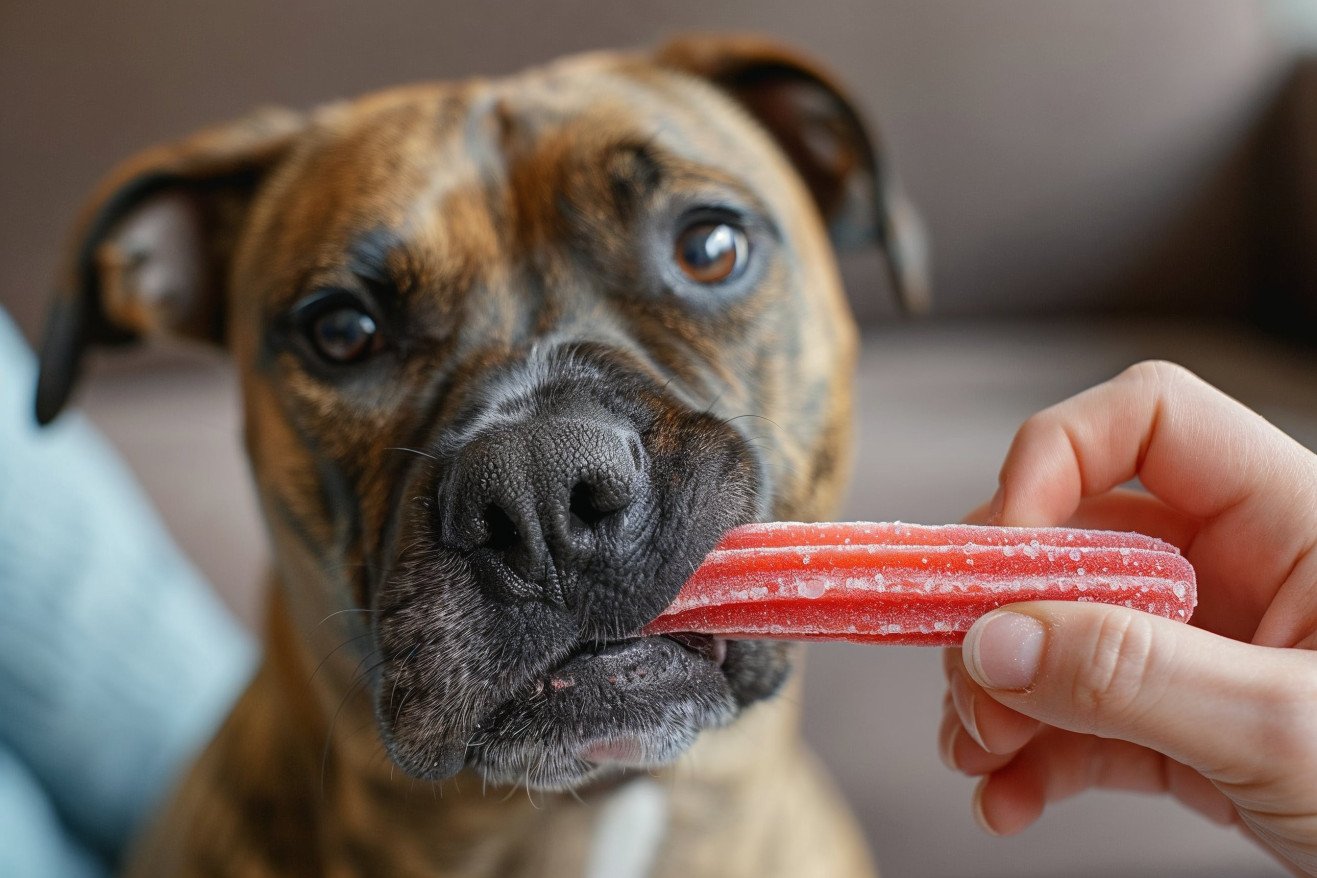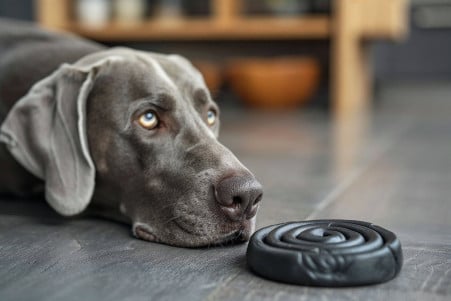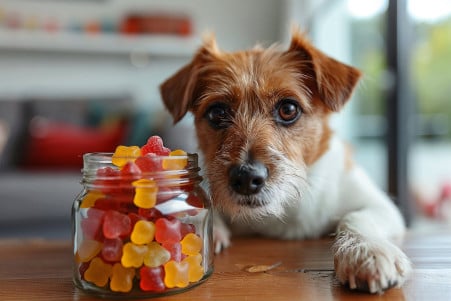Can Dogs Eat Twizzlers? Understanding the Risks and Alternatives
10 February 2024 • Updated 9 February 2024

You may love to snack on Twizzlers, but can you share them with your dog? No, dogs cannot eat Twizzlers. Twizzlers are high in sugar and contain black licorice, which has glycyrrhizin in it, a substance that is poisonous to dogs. Eating Twizzlers can lead to obesity, dental problems, and other more serious health issues for dogs. Stick to treats that are made for dogs.
This article will look at the evidence provided by veterinary medicine and animal nutrition studies to explain the dangers of giving dogs Twizzlers. It will also explore other treat options that are more in line with a dog’s nutritional needs. This information will help you make better choices about your dog’s diet that will help support their overall health and wellness in the long run.
Can dogs eat Twizzlers?
The Health Risks of Sugar and Artificial Sweeteners for Dogs
If you feed your dog sugary snacks like Twizzlers, you could be putting them at risk for a number of health problems. According to PetMD, sugar can cause a range of issues in dogs, including an upset stomach, obesity, metabolic changes, diabetes, and pancreatitis.
In general, the more sugar a dog eats, the worse the side effects, which can include dental problems and hormonal imbalances. In addition to these risks, artificial sweeteners come with their own set of problems.
For example, xylitol, an artificial sweetener, is highly toxic to dogs, and can cause seizures, liver failure, and death in even small amounts, according to Dr. Jerry Klein, the Chief Veterinary Officer for the American Kennel Club.
Dogs process sugar and artificial sweeteners differently than people, and this can lead to a number of health problems. While Twizzlers don’t contain xylitol, the fact that it’s present in other treats is a reminder of the importance of being careful about what you feed your dog.
All veterinary professionals agree that sugar and artificial sweeteners have no place in a dog’s diet because of the potential for both short-term and long-term health problems. That’s why it’s important to monitor the treats your dog eats and choose options that will support their health.
Potential Hazards of Twizzlers for Dogs
While Twizzlers may seem like a fun and harmless snack, the ingredients in this candy can be dangerous for dogs. One of the biggest issues is the high fructose corn syrup, which, as Vegan Foundry notes, can lead to obesity and dental issues in dogs because of its high sugar content.
Dogs can also develop insulin resistance and type 2 diabetes from eating foods that are high in sugar, which is a concerning parallel between dog and human health.
The black licorice flavor of Twizzlers is even more dangerous because it contains glycyrrhizin. As Hepper explains, glycyrrhizin, which is found in licorice root, can cause high blood pressure and even be toxic to dogs when it’s extracted.
If your dog eats Twizzlers, especially the black licorice kind, it’s important to keep a close eye on them for any signs of trouble. If they start vomiting or acting strangely, it’s important to get them to the vet as soon as possible.
While eating a small piece of Twizzler every once in a while probably won’t cause any immediate problems, the potential hazards associated with the ingredients in this candy make it a bad choice for your dog. It’s always best to play it safe when it comes to your pet’s treats and choose things that will help them stay healthy.
Regulatory Perspective: Pet Food Safety Standards
Pet food safety is a top priority. The U.S. Food and Drug Administration (FDA) is responsible for regulating pet food under the Federal Food, Drug, and Cosmetic Act, which requires that animal foods be safe to eat, produced under sanitary conditions, and properly labeled.
The FDA also requires that animal food facilities have a food safety plan in place, which includes hazard analysis and preventive controls, as part of the Food Safety Modernization Act.
In addition, the Association of American Feed Control Officials (AAFCO) has set standards for defining ingredients and establishing pet food safety requirements. AAFCO works with the FDA to make sure that the pet food regulations are strict and thorough.
Human food items like Twizzlers are not held to the same high standards as pet food, so they may contain ingredients that are unsafe or not suitable for pets. This makes it important to choose treats that meet the standards set by the FDA and AAFCO to ensure quality and safety. Doing so will help pet parents avoid exposing their pets to potentially harmful ingredients in products that aren’t meant for pet consumption.
Human Foods That Are Toxic to Dogs
There are many human foods that can be toxic to dogs, and some of them may surprise you. The ASPCA lists several foods that pet owners should avoid giving to their dogs.
Chocolate is one of the most well-known toxic foods for dogs, and it contains methylxanthines, which can cause symptoms like vomiting, diarrhea, and even death.
Grapes or raisins can cause kidney failure in dogs, and the toxic substance in them is unknown. Meanwhile, Twizzlers, which are made with sugar and artificial flavors, have a lot in common with these toxic foods and can be harmful to dogs by contributing to obesity, dental issues, and potentially toxic reactions.
The ASPCA’s Animal Poison Control Center also notes that xylitol, an artificial sweetener found in many products, can cause liver failure and hypoglycemia in dogs. This is a good reminder to be careful about the treats we give our dogs. Other ingredients like macadamia nuts can cause weakness in dogs, and garlic can cause gastrointestinal irritation. These foods all contain substances that dogs can’t metabolize, just like the glycyrrhizin in black licorice Twizzlers.
To avoid accidental poisoning, make sure that dangerous foods are kept out of your dog’s reach and that your pantry doors and trash cans are secure. Knowing which human foods are toxic to dogs and why they’re toxic can help you make sure that your dog’s diet is safe and healthy.
Healthy and Nutritious Treats for Your Dog
In order to maintain a healthy diet for your dog, it’s important to make sure that the treats you’re giving them are meeting their nutritional needs. Dogs need a balanced diet that includes proteins, fats, carbohydrates, vitamins, and minerals in the right ratios.
The team at Holiday Barn Pet Resorts suggests treats that meet these nutritional requirements, including fruits like blueberries, watermelon, pumpkin, and apple slices, and vegetables like sweet potatoes, peas, green beans, and carrots.
Not only do these treats offer nutritional value, but they also add some variety to your dog’s diet without the health risks that come with candy.
The importance of choosing treats that are specifically made for dogs can’t be emphasized enough. These treats are made to be safe, easily digestible, and nutritionally complete, which can give pet owners peace of mind.
Pet owners should also make sure that they’re reading the labels of the treats that they’re buying, which is an important step in making sure that the treats don’t have any harmful additives and that they meet the dietary needs of their dog.
It’s always a good idea to talk to your vet about the treats that you’re giving your dog, as they can provide personalized recommendations based on your dog’s health and lifestyle. By choosing treats that are safe for dogs and working with professionals, you can make sure that you’re rewarding your pet in a way that’s healthy and ensures their well-being.
Final Thoughts: Can Dogs Eat Twizzlers?
In this article, we’ve covered everything you need to know about whether or not Twizzlers are safe for dogs to eat. In short, Twizzlers are not a good option for dogs due to their high sugar content and the presence of glycyrrhizin in black licorice flavors, which is toxic to dogs. Consuming Twizzlers can lead to a range of health issues, from tooth decay to obesity to more serious side effects.
We’ve also gone over the dangers of sugar and artificial sweeteners in dog food, and the importance of looking for treats that meet the standards set by pet food regulatory agencies. The FDA and AAFCO are important organizations that help ensure the safety and nutritional value of pet food.
As pet parents, it’s our responsibility to give our dogs treats that are not only tasty but also healthy and safe. It’s important to carefully check the ingredients in pet treats and make sure they meet the standards set by pet food regulatory agencies. This will help us to be worthy of the trust our dogs put in us and ensure that they live long, healthy lives.


